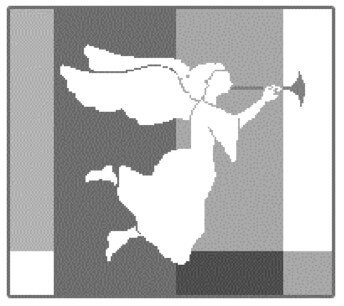December 22
1In the beginning was the Word, and the Word was with God, and the Word was God. 2He was in the beginning with God. 3All things came into being through him, and without him not one thing came into being. What has come into being 4in him was life,* and the life was the light of all people…. 14And the Word became flesh and lived among us, and we have seen his glory, the glory as of a father’s only son,* full of grace and truth….18No one has ever seen God. It is God the only Son,* who is close to the Father’s heart,* who has made him known.
John 1:1-3, 14, 18
In the old Broadway play, “Green Pastures,” Pulitzer Prize winning playwright, Marc Connelly, told stories from the Bible as seen through the eyes of an African-American child growing up during the Depression. In one especially moving scene, the Lord God is looking out over the parapets of heaven trying to decide what to do about his wayward children down on earth.
Then, stage right, the angel Gabriel enters, horn tucked under his arm, moistening his lips and ready to sound the trumpet. “No, no,” the Lord stops him. “Not yet Gabriel, put your trumpet away.” Gabriel asks the Lord what he is going to do about his quarrelsome kids down below. Will he send David down, or Moses, to take care of the situation? Will the Lord send a prophet? “We have a lot of good prophets, up here, you know, Lord.” The Lord pauses, looks Gabriel in the eye, and says, “I’m not going to send anyone. This time, I’m going myself.”
And that is what God did! It was God himself who came down to us at Christmas. The eternal Word came down and clothed himself our humanity. He became one with us and took up our cause.
Scripture is painstakingly precise in its statement about the Incarnation, or literally, the “en-flesh-ment.” When the Gospel says that the eternal Word became “flesh,” it uses a Greek term that refers to far more than just skin and bones, and body. John uses a word that encompasses the totality of who we are as humans, our minds and bodies and spirits. John sought to say it as clearly and forcefully as he could: “The Word became flesh.” The infinite, eternal God took to himself our human condition, except sin. As Augustine of Hippo (A. D. 354-430) said, “He put on what he was not, without losing what he was.”
The Gospel also seeks to be as clear about his deity as his humanity. The Word who became flesh was really God with us. While clothing himself in full humanity he was also God. In the face of Jesus the very glory of God was revealed.
So the Gospel bears testimony: “We have seen his glory, the glory as of a father’s only son, full of grace and truth.” It is a fascinating word that is translated here as “a father’s only son.” It is a rendering of the Greek word, monogenes. The first part of the first, mono, means, “one,” and genes is the word from which our word “gene” and “genetic” come. In language of the 21st century we might translate monogenes as “the only genes of the Father,” or, “the same chromosomes as the Father.” John is saying that Jesus is “of the same nature as the Father.”
For any who ever wonder what God is like, they have only to consider Jesus! Jesus is the full revelation of God, John’s Gospel says. He is, “full of grace and truth,” as is the Father!
PONDER
Read, Reflect, Respond, and Rest with today’s scripture,
John 1:1-3, 14, 18, and devotional.
Today’s Moments of Diaphany
- an answer to prayer
- evidence of his love and care
- evidence of his creative power and wisdom
- his help to do his work




